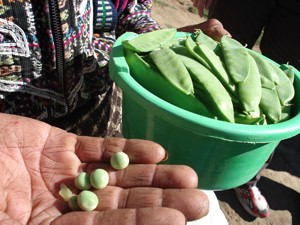
The story of agricultural diversification—the change from growing only basic grains for family consumption to growing a diverse group of crops sold in national and international markets—is the story of thousands of farmers in the Guatemalan Highlands that has increased incomes, jobs, and opportunity, transforming hundreds of thousands of lives.
The Highlands cover seven of Guatemala’s 22 departments. They comprise less than a fi fth of the country’s surface area, but include more than 60 percent of the country’s farms, most of which are very small, less than two acres each.
Natural disasters, 36 years of civil war, mountainous terrain, and a long history of social and political exclusion explain the poverty and low level of public investment in the Highlands. These combined factors limit the ability of farmers to produce anything other than subsistence corn, beans and vegetables. After a decade of implementation of the Peace Accords that were signed in 1996, investments in farm-to-market access roads, smallscale irrigation systems, and vegetable processing facilities are allowing farmers to begin to diversify.
In March 2008, USAID and implementing partners launched the Inclusive Market Alliance for Rural Entrepreneurs. The alliance works to expand and diversify the rural Guatemalan economy to promote the growth of an entrepreneurial agricultural sector among underserved populations.
With alliance resources, small-scale rural farmers are becoming entrepreneurial producers of premium products and turning cooperatives into sustainable small businesses. The story of the Samajelá Taq Winaq Group in Zaragoza, Chimaltenango is a good example. For more than 12 years Samajelá produced only strawberries, corn and beans. Their labor force of 38 men and women came from family members of six founding families. Like many rural groups, Samajelá has struggled to surpass many barriers; selling to a formal market was one of them. They were forced to sell products to middle-men who paid prices scarcely above production costs.
As part of the USAID-supported alliance, the Samajelá Group is receiving training to improve farming and adopt post-harvest techniques, diversify from traditional to market crops, increase productivity, and market harvests more effectively. In addition to strawberries, corn and beans, they now produce Iceberg, Romaine, green and purple endive lettuce, cauliflower and cabbage that are attractive to the retail sector for internal consumption and export.
These new products are grown under the highest quality standards, complying with criteria required to access international markets. Samajelá has increased its work force by 166%—now 45% are women.. As the type and volume of produce sold in formal markets grows, higher and more consistent income leads to increases in education, health and food security for the original six Samajelá farmer families as well as for surrounding communities that provide the additional day labor work force.







Comment
Make a general inquiry or suggest an improvement.